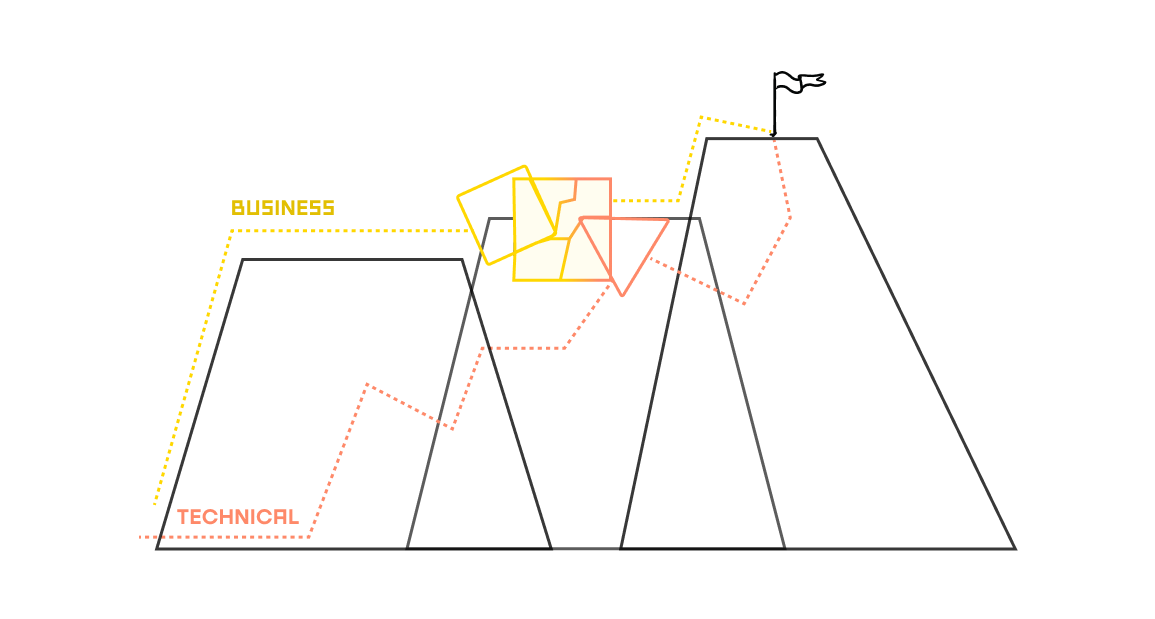
Starting a company is no easy feat - especially when you’re a non-technical founder in a tech-driven world. You have an innovative idea, a strong grasp of your market, and a business model set to shake up your industry. Yet, the gap between your vision and the technical know-how to bring it to life can feel like a canyon - and you need a solid bridge to cross it.
Many non-technical founders consider hiring a full-time CTO to bridge this gap. But this choice presents its own challenges, including significant costs, reduced flexibility, and the often “invisible” cost of the hiring process, which can be a struggle in itself.
And what if there was an alternative: a solution that closes the tech gap without breaking the bank or tying you down? This is where a Fractional CTO steps in. Having already provided this kind of function for some of our clients, we’ve decided to share some insights and explain why betting on a Fractional CTO could be the game-changing decision your startup needs.

The Fractional CTO: Your Strategic Tech Ally
An FCTO is not just a part-time Chief Technology Officer. They function as your strategic tech ally, delivering high-level technical expertise without the financial weight of a full-time executive hire.
In short, a Fractional CTO can act as a clutch to optimise costs, time & direction, elevating and de-risking your business at its early stages. And if you’re not sure exactly how this happens, read on.
Why Go Fractional? Clarifying the Misconceptions
Before going deeper into why it might make sense for you to go fractional, let’s start with what a Fractional CTO actually does for a startup and how they help it grow.
An FCTO does more than just manage the tech part of your business. They also take care of tech budgeting, helping you allocate resources better.

One key role of an FCTO is translating business goals and risks into technical language and vice-versa. CEOs and developers often struggle to find common ground and understand each other. Fractional CTOs also help founders and CEOs fully understand the implications of every compromise made, both in terms of business and tech decisions. It’s about finding the best balance between the two, ensuring that both understand each other, and that the solution you go for aligns with the current goals.
Moreover, an FCTO allows the founder or CEO to focus on their main tasks, taking care of business while the tech part is in good hands. Regular syncs ensure that the tech strategy aligns with the business strategy, without pulling the founder away from their main responsibilities and reducing time wasted.

Some practical examples of what an FCTO can tell you and decisions they can help you make would be:
- Feature X & Y have poorly defined requirements, and a lot of resources could be burned on something that might not be a must-have, unlikely to be released on time. The risk is too high considering doubtful benefits. Features resemble factory pipelines, in that the more we advance the features, the higher the cost of halting will be. We can save time and money by being pragmatic and strategic, but this requires a strong blend of product and technical understanding with a business approach.
- We will use Rails instead of .NET, as you will get fast prototyping and a high pace, resulting in faster initial development until MVP, and when we scale some performance optimisation will be needed.
- We will buy code in the short term, allowing for faster development, fewer bugs or need of maintenance, which is handy at first, we can focus and put more budget on the key goals. In the future we may have slightly less flexibility, but without this the initial release could be compromised.
One very important thing an FCTO can help you with is de-risking at those early stages of your startup. By providing technical expertise, flexibility, efficient resource allocation, and strategic guidance, an FCTO plays a crucial role in minimising risks and setting your startup on a path to success.
When to Choose a Fractional CTO and When to Switch to Full-Time?
In the early stages, when you have budget constraints and speed and flexibility are key, opting for a Fractional CTO can be a strategic decision. An FCTO gives you the expertise you need, when you need it, without the commitment and cost of a full-time executive. Moreover, they help you get the right team: build, replace, provide, or scale. They can mentor people and keep them accountable.
Some founders might worry that an FCTO won’t understand the business as deeply as a full-time CTO. But in fact, having already supported a number of startups across industries, the right FCTO can offer you continuity, a deep understanding of business implications, and the flexibility so often needed in the dynamic startup environment.
As your startup matures and achieves stability, hiring a full-time CTO may become necessary. This could be when your tech needs become more complex and need full-time attention, or you secure funding and can afford a full-time executive. The right FCTO will tell you when it’s time to make the switch, define the job requirements, and even aid in the hiring process. Finally, they will ensure a seamless transition, helping your new CTO understand both the tech strategy and business goals, reducing risk of miscommunication.
Navigating the Tech Landscape with a Fractional CTO
While it may be tricky to navigate the world of tech on your own, and difficult to hire the right full-time CTO at an early stage, an FCTO can be your ideal interim solution to propel your business forward and raise funding.
At Whitesmith, we’re here to help you make the right choices to accelerate your startup journey. We have worked with startups in various sectors, ensuring that their tech solutions align with their ideas and strategic goals, while operating within the bounds of startup budgets and resources.
One of our clients we’ve supported with a FCTO type of role (even if it wasn’t explicitly called that at the time), and an interim team, was Create Academy. Whitesmith helped them develop a new business strategy and product strategy aligned with their high-level goals, and ultimately raise funding that allowed them to build an internal team.
If you’d like to know how to transform your innovative ideas into a successful reality, we are here to help. Contact us today and let’s build something exceptional together.
The Non-Technical Founders survival guide
How to spot, avoid & recover from 7 start-up scuppering traps.
The Non-Technical Founders survival guide: How to spot, avoid & recover from 7 start-up scuppering traps.
